Assistant Coach of the Dallas Stars, Alain Nasreddine has lead quite the interesting life, and he’s rocking into the season with a red-hot Stars team which has been one of the leading contenders and Cup favorites going into the season. I was lucky enough to get an interview with him to discuss his background and the future of the Stars.
Coach Nasreddine comes from a fascinating background. With a Father from Lebanon and a French-Canadian mother, his family background did not stop him from getting into hockey. “My dad didn’t know much about hockey when he first immigrated to Canada,” Mr Nasreddine recalls “He married my mom who’s French Canadian. So obviously she knew all about hockey. So I would say it probably came on my mom’s side.”
“My grandfather used to play. We were all huge Montreal Canadiens fans and I started playing at the age of four. Well, I didn’t know any better at the time. I just know I started at four and that’s what you do up in Canada. You start early and that’s what you do. You play hockey in the winter and I did play baseball in the summer to change it up.”
Coach Nasreddine’s path as a player continued through the Quebec Juniors; “You know, it wasn’t bad back then, if you’re good enough, you made the top team and then, you just made your way up.”
And that’s what he did, moving through the draft process as a young man – “I played junior hockey at a young age. I got drafted at another age. So that gave me two years to prove myself before the NHL draft.”
“The NHL draft was actually disappointing for me because I went higher than I expected – higher meaning sixth round – and I was hoping I’d go in the top three rounds.
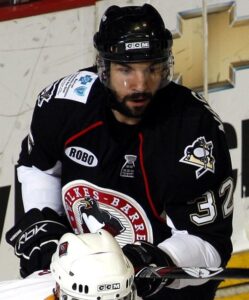
So that was a disappointment, some adversity there. Then I turned pro at the age of 20 and just worked my way up and got my first NHL game with Chicago Blackhawks after spending three years in the minors. If you follow my stats, you can see I bounced around quite a bit.”
His one goal in the NHL didn’t disappoint though; “What was really special about that goal is, I was with the Pittsburgh Penguins at the time, I scored against the Montreal Canadiens, in Montreal, which was my favorite team, a team I grew up watching. My friends were in the stands, my family. So it was special.” It also doesn’t hurt it came off of two hall of fame players – Sidney Crosby and Mark Recchi.
However, he always had an eye to a coaching career despite his stints in the big leagues.
“As I was playing, I was getting older. I was getting into my late 20s and you start thinking about, what’s going to be next, especially when you’re not a regular in the NHL. I love the game of hockey so much that I knew that I wanted to stay in the game, and I wanted to coach. So at 27, 28, 29, I started getting ready. I started asking my own coaches things that you need to know about coaching, drills, and had really good coaches throughout my career. So I took a little bit from all of them.”
“Then I played early 30s in Pittsburgh and had a lot of success there to finally, break into the NHL on a regular basis. And then I came to an end and I finished my career in Germany for two years. And then the injuries started piling up and there was time to really look into, okay, what’s going to come next. I could have played an extra year or two, but there was a job opening in Wilkes-Barre/Scranton as an assistant coach. I had spent five years there on and off as a player. So I had connections there and people that trusted me and I applied for the job and ended up getting it.”
This transition from playing to being a defense-focused assistant coach in the AHL affiliate of the Penguins did not phase Mr. Nasreddine at all; “It was a seamless transition. I went right from player to coach and that’s how it all started.”
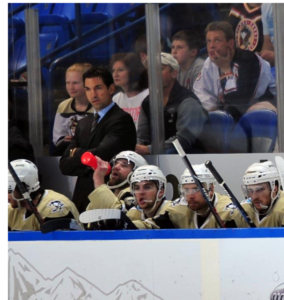
While in Scranton, Mr. Nasreddine developed his coaching style that has led to high performing defenses. While this coaching style has certainly been influenced by his variety of experience, from Quebec, to the NHL, to Germany, he has strived to make it his own.
“I had a lot of good coaches. Michel Therrien, Alain Vigneault, Claude Julien, Peter Laviolette, those are all coaches I came across. So they all helped me shape, you know, the kind of coach I am now. But at the end of the day, you got to be yourself. You touched on me playing in Quebec, I played in the American Hockey League for a while, I played in the NHL, I played with superstars. I saw guys grinding just to make it to the NHL, and I saw the guys that grinded but never made it. So, I had a lot of experience and I felt like I could relate to anyone that’s playing the game just because of my experiences.”
After being hired out of Scranton by the New Jersey Devils, Coach Nasreddine took the team through some rough times, even being elevated to acting head coach after a midseason firing of their head coach. After his contract there ended in 2022, he was hired by Pete DeBoer to focus on the defensive side of the ice in Dallas.
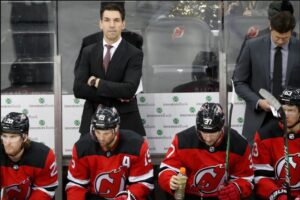
“It’s been outstanding” Mr Nasreddine said on his time in the city so far, “and I’ll tell you why. And, you know, everyone will say this, right? They’ll get to a new environment and they’ll say, I love it, but I’ll tell you why I love it. I broke into the NHL with the New Jersey Devils. They were under a rebuild, had a lot of good experiences there, a lot of good memories. I actually was interim head coach for a bit. It was good, but, you know, there was a lot of losing. We lost a lot of games. Success wasn’t easy. We made it to the playoffs only once. That cratered the next two years. So that was tough. You do this job, you’re in this business, and the business is of winning games, and we lost a lot of games.”
“Coming here to Dallas in our first year, it was, it was nice to realize that you go into a game expecting to win and not hoping to win. You know, there’s a big difference and that’s, that’s been the case now for two and some change years. A lot of success our first two years, making it to the conference final each year. Expectations are obviously high, but that’s what you want in this line of work is, you know, being on a good team and winning more games than you lose. And that’s, that’s what I have here. And it’s been, it’s been awesome. We have a great coaching staff, I’m still learning from like Pete DeBoer, who’s an excellent coach, I get to learn from every day, and I still want to be a head coach.”
His work on the defensive side has been a massive success with Dallas, with Miro Heiskanen rocketing to superstar status. Obviously, he’s loved that transition.
“It’s fun. It’s fun to work with some of those young talents, especially like Miro, who’s world-class. It’s amazing with guys like that, you see the talent, but you see how committed they are and how competitive. If you watch Miro play, there’s different ways of being competitive. You know, there’s some guys that will hack and whack and grind, but Miro is just all about winning puck battles subtly. It doesn’t matter how he does it, but he wants to be on the right end of every battle. It’s just amazing to see a talent like him perform every night, and I play him 24 to 28 minutes every night and he’s so, so consistent.”
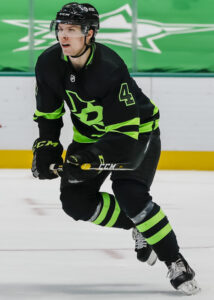
Obviously, Miro is not the only one out there on the ice, despite his impressive ice time.
“There’s other guys too, like [Thomas] Harley, a young prospect, a young talent who’s coming into his own. Those are always fun to work with. I enjoy working with young defensemen because you can have an impact on them. You can help them and it’s fun. I’m not saying working with older guys isn’t, but they’re set in their ways already. They’ve had success already and they’re usually, they’re self-motivated. They don’t need much, but with the young guys, it’s always an adjustment in this league. So I enjoy working with the young guys, especially on the D.”
Finally I asked Mr. Nasreddine whether he had any advice for people getting involved in pro sports, whether hockey or any others.
“I would say first thing, look at yourself in the mirror and say, am I passionate about this? How passionate am I? Because I’ll tell you what, to be doing this, if you’re not passionate, you get no chance of succeeding. It’s zero. And once you have that, then the rest is easy. Like everyone wants to work hard, but to me, if you have the passion, it’s easy to work hard. It’s easy for me tomorrow to get up at six and get to the office and break down video and get ready. Because that’s what we do. You know, we get up early. The players, they have it good. I know I was on both sides. Well, I was a player where I just get up at eight and show up to the rink at nine and practice at 10:30, sit there for a 10-minute meeting. But that 10-minute meeting now that I put together, it takes me probably a couple hours. You know, so it’s a lot of work. But like I said, if you’re passionate, you love it, it’s not work.
“You’re going to hear this in any area of life. It doesn’t matter what you do, but it’s so true, especially in our business. The reason I love it is it’s not a nine-to-five job. You’re not sitting at a desk. I played for a long time.”
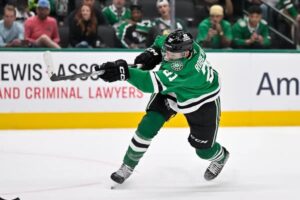
“This is probably the next best thing other than playing.”
“For people that are trying to do it, I say start somewhere and then who knows where that’s going to take you. It’s tough. I was fortunate to play for a long time and I started my coaching career professionally, but that’s not the case for everybody. I can give you names of people that have started at the bottom and made their way up. We have our assistant coach, Misha Donskov, who never really played pro and started coaching minor hockey and worked his way up and started working with Hockey Canada. And here he is with us now and he’s going to be representing Canada at the Four Nations. That’s just one example. Peter DeBoer wanted to be a lawyer. John Cooper with the Tampa Bay Lightning was a lawyer and started coaching minor pro. So it doesn’t matter where you start, the younger, the better. I think it’s always a path if you’re truly dedicated and really want it, you just have to go.”
